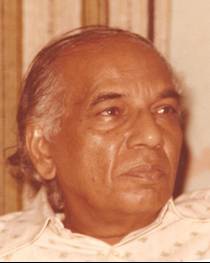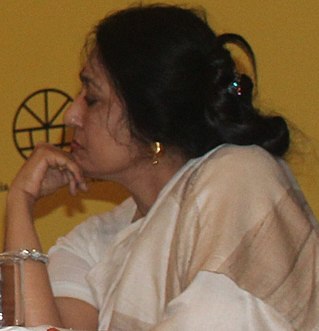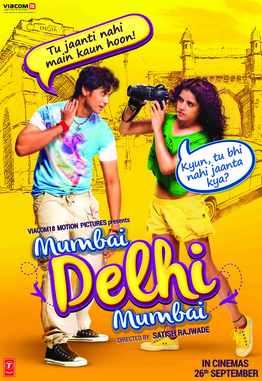
K. Satchidanandan is an Indian poet and critic, writing in Malayalam and English. A pioneer of modern poetry in Malayalam, a bilingual literary critic, playwright, editor, columnist and translator, he is the former editor of Indian Literature journal and the former secretary of Sahitya Akademi. He is also social advocate for secular anti-caste views, supporting causes like environment, human rights and free software and is a well known speaker on issues concerning contemporary Indian literature. He is the festival director of Kerala Literature Festival.

Mahadevi Verma was an Indian Hindi-language poet, essayist, sketch story writer and eminent personality of Hindi literature. She is considered one of the four major pillars of the Chhayawadi era in Hindi literature. She has also been addressed as the Modern Meera. Poet Nirala had once called her "Saraswati in the vast temple of Hindi Literature". Verma witnessed India before and after its independence. She was one of those poets who worked for the wider society of India. Her poetry, along with her work towards social upliftment and women's welfare, were depicted in her writings. These works, especially her novel Deepshikha, greatly influenced both readers and critics.

Sachchidananda Hirananda Vatsyayan, popularly known by his pen name Agyeya, was an Indian writer, poet, novelist, literary critic, journalist, translator and revolutionary in Hindi language. He pioneered modern trends in Hindi poetry, as well as in fiction, criticism and journalism. He is regarded as the pioneer of the Prayogavaad (experimentalism) movement in modern Hindi literature.

Safdar Hashmi was a communist playwright and director, best known for his work with street theatre in India. He was also an actor, lyricist, and theorist, and he is still considered an important voice in Indian political theatre. He was an activist of the Students' Federation of India (SFI).

Subhadra Kumari Chauhan was an Indian poet. One of her most popular poems is Jhansi Ki Rani.

Rekhta was an early form of the Hindustani language. This style evolved in both the Perso-Arabic and Nagari scripts and is considered an early form of Modern Standard Urdu and Modern Standard Hindi. According to the Pakistani linguist and historian Tariq Rehman, Rekhta was a highly Persianized register of Hindustani, exclusively used by poets. It was not only the vocabulary that was Persianized, but also the poetic metaphors, inspired by Indian landscapes and seasons, were abandoned in favor of the Persian ones i.e. bahaar (spring) replacing barsaat.

Chandrashekhara Basavanneppa Kambara is a prominent Indian poet, playwright, folklorist, film director in Kannada language and the founder-vice-chancellor of Kannada University in Hampi also president of the Sahitya Akademi, country's premier literary institution, after Vinayak Krishna Gokak (1983) and U.R. Ananthamurthy (1993). He is known for effective adaptation of the North Karnataka dialect of the Kannada language in his plays, and poems, in a similar style as in the works of D.R. Bendre.

Syed Ali Jawad Zaidi was an Indian Urdu poet, scholar, and author of over 80 books in several languages. He was also an Indian independence activist, lawyer and later a civil servant, but is best known for his work in Urdu literature.
Kunwar Narayan was a poet in Indian literature in Hindi. He read and traveled widely and wrote for six decades. He was linked to the New Poetry movement.
Chandradhar Sharma Guleri was a writer and scholar of Hindi, Sanskrit, Prakrit and Pali from Jaipur, India. He was born in Jaipur and his father belongs to Guler village in Himachal Pradesh hence "Guleri" at the end of the name. Described as a versatile genius, he is known as the author of Usne Kaha Tha, first published in 1915, which is debated to be the first short story in Hindi. He is also remembered for his efforts to preserve the Jantar Mantar Observatory in Jaipur.
Indra Bahadur Khare was an Indian Hindi-language poet, a participant in Kavi-Sammelan, and a professor of 20th century Hindi literature.

Madhur Kapila was an Indian novelist, journalist, art critic and a reviewer of Hindi literature.

Anamika is a contemporary Indian poet, social worker and novelist writing in Hindi, and a critic writing in English. My Typewriter Is My Piano is her collection of poems translated into English. She is known for her feminist poetry.

Mumbai Delhi Mumbai is 2014 Hindi language Indian romance-comedy written and directed by Satish Rajwade for Viacom 18 Motion Pictures. The film, adapted from Rajwade's 2010 Marathi movie Mumbai-Pune-Mumbai, stars Shiv Panditt and Pia Bajpai, and released on 5 December.

Teji Grover is a Hindi poet, fiction writer, translator and painter. According to poet and critic Ashok Vajpeyi, "Teji Grover shapes her language away from the prevalent idiom of Hindi poetry. In her poetry language acquires a form which is unique..." Her poems have been translated into many Indian and foreign languages.

Sunita Jain (1941–2017) was an Indian scholar, novelist, short-story writer and poet of English and Hindi literature. She was a former professor and the Head of the Department of Humanities and Social Sciences at the Indian Institute of Technology, Delhi. She published over 80 books, in English and Hindi, besides translating many Jain writings and some Hindi literature into English. She is featured in the Encyclopedia of Post-Colonial Literatures in English and was a recipient of The Vreeland Award (1969) and the Marie Sandoz Prairie Schooner Fiction Award. The Government of India awarded her the fourth highest civilian honour of the Padma Shri in 2004. In 2015 she was awarded the Vyas Samman by the K.K. Birla foundation for outstanding literary work in Hindi. In 2015 she was awarded an honorary D.Litt. from the University of Burdhwan, West Bengal.

Dinesh Nandini Dalmia, also written as Dineshnandini Dalmia, was an Indian poet, short story writer and novelist of Hindi literature. She was the fifth wife of Ramkrishna Dalmia, founder of the Dalmia Group, and three of his four previous wives were still alive and married to him when she became his fifth wife. Nevertheless, she positioned herself in opposition to gender discrimination and purdah system, and published poems, prose poems, short stories and novels on the theme of women's emancipation. Shabnam , Niraash Aasha, Mujhe Maaf Kama and Yeh Bhi Jhooth Hai are some of her notable works. The Government of India awarded her the third highest civilian honour of the Padma Bhushan, in 2006, for her contributions to literature. In 2009, India Posts released a commemorative stamp on her.

Sukriti Kakar is an Indian singer born in New Delhi. Kakar rose to prominence after recording title song from the film Boss composed by Meet Bros which featured Yo Yo Honey Singh. Since then she has sung many songs most notably, "Kar Gayi Chull" from Kapoor & Sons which became a huge hit.
Bismil Azimabadi was an Indian freedom fighter, landlord, and an Urdu poet from Patna, the capital of Bihar.

aayush yadav is a Nepalese novel writer. He has authored over 60 stories and novels, most of which address contemporary social issues. He is known as Akhyan Purush(towering personality) in Nepali literary circle.















